NewsBeat
Syrians returning home face deadly threat of landmines
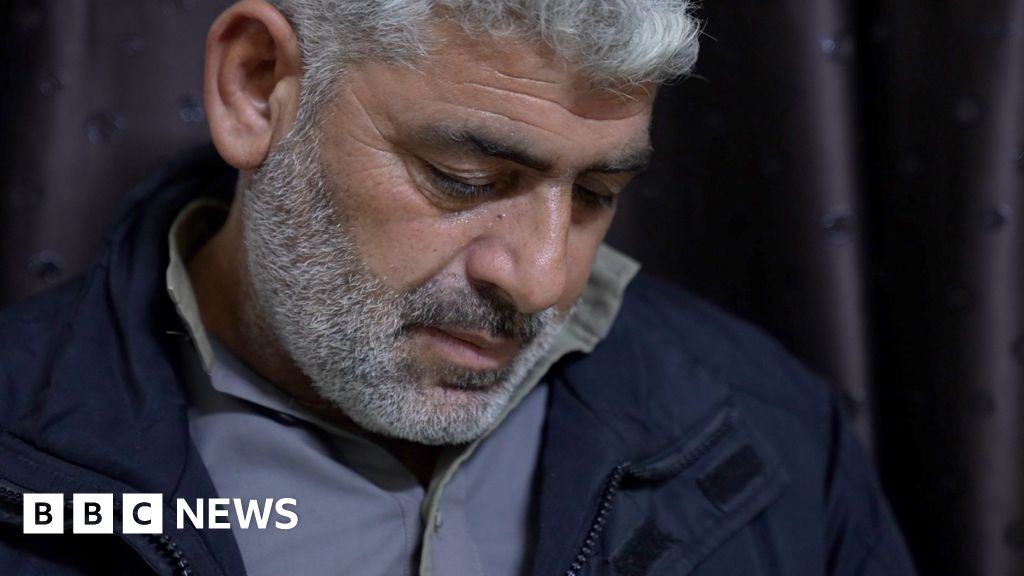
Idlib, Syria
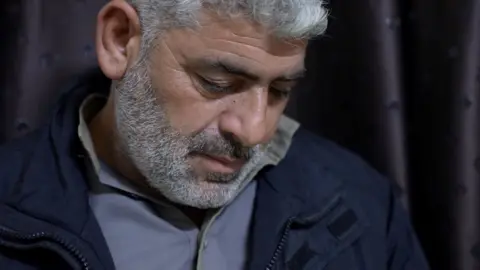 BBC
BBCAyghad never thought that his dream of returning to his farmland could turn into a nightmare.
He fights his tears as he shows us a picture of his late father, smiling and surrounded by abundant olive trees in their land in Idlib province, northwestern Syria.
The picture was taken five years ago, a few months before forces linked to the former government took over their village, near the city of Saraqeb.
The city was a strategic stronghold for Syrian opposition factions for years, before forces allied with the fallen regime of Bashar al-Assad launched an offensive against rebels in Idlib province at the end of 2019.
Hundreds of thousands of residents fled their homes, as Assad forces took over several other rebel strongholds in the northwest by early 2020.
Ayghad and his father were among those displaced.
“We had to leave because of the fighting and air strikes,” Ayghad says, as the tears fill his eyes. “My father was refusing to leave. He wanted to die in his land.”

The father and son longed to return ever since. And when opposition forces regained control of their village in November 2024, their dream was about to come true. But disaster soon struck.
“We went to our land to harvest some olives,” Ayghad explains. “We went in two separate cars. My father took a different route back to our home in the city of Idlib. I warned him against it, but he insisted. His car hit a landmine and exploded.”
Ayghad’s father died instantly at the scene. Not only did he lose his dad that day, but he also lost his family’s main source of income. Their farmland, spread across 100,000 square metres, was filled with 50-year-old olive trees. It’s now been designated a dangerous minefield.
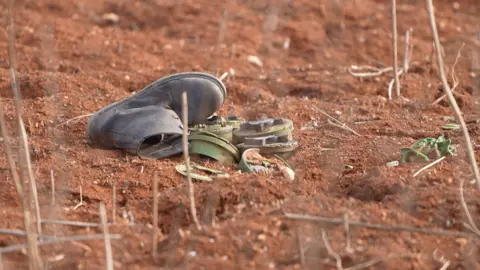
At least 144 people, including 27 children, have been killed by landmines and unexploded remnants of war since Bashar al-Assad’s regime fell in early December, according to the Halo Trust, an international organisation specialising in clearing landmines and other explosive devices.
The Syria Civil Defence – known as the White Helmets – told the BBC that many of those killed were farmers and landowners who were trying to go back to their land after the Assad regime collapsed.
Unexploded remnants of war pose a grave threat to life in Syria. They’re mainly split into two categories. The first are unexploded ordnances (UXOs) like cluster bombs, mortars and grenades.
Hassan Talfah, who heads the White Helmets team clearing UXOs in north-western Syria, explains that these devices are less challenging to clear because they are usually visible above ground.
The White Helmets say that, between 27 November and 3 January, they cleared some 822 UXOs in north-western Syria.
The bigger challenge, Mr Talfah says, lies in the second category of munition – landmines. He explains that former government forces planted hundreds of thousands of them across various areas in Syria – mainly on farmland.
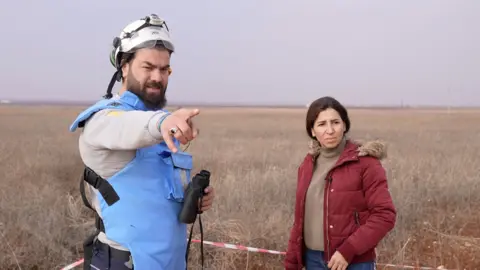
Most of the deaths recorded since the Assad regime fell happened on former battle front lines, according to the White Helmets. Most of those killed were men.
Mr Talfah took us to two huge fields riddled with landmines. Our car followed his on a long, narrow and winding dirt road. It’s the only safe route to reach the fields.
Along the sides of the road, children run around the area. Hassan tells us they are from families who have recently returned. But the dangers of mines surround them.
As we get out of the car, he points to a barrier in the distance.
“This was the last point separating areas under the control of government forces from those held by opposition groups” in Idlib province, he tells us.
He adds that Assad forces planted thousands of mines in the fields beyond the barrier, to stop rebel forces from advancing.
The fields around where we stand were once vital farmlands. Today, they are all barren, with no greenery visible except for the green tops of land mines that we can see using binoculars.
With no expertise in clearing land mines, all the White Helmets can do for now is cordon these fields off, and hammer down signs along their borders warning people off.
They also spray-paint warning messages on dirt barriers and houses around the edges of the fields. “Danger – landmines ahead,” they read.
They lead campaigns to raise awareness among locals about the dangers of entering contaminated lands.
On our way back, we come across one farmer in his 30s who has recently returned. He tells us that some of the land belongs to his family.
“We couldn’t recognise any of it,” Mohammed says. “We used to plant wheat, barley, cumin and cotton. Now we cannot do anything. And as long as we cannot cultivate these lands, we will always be in poor economic condition,” he adds, clearly frustrated.
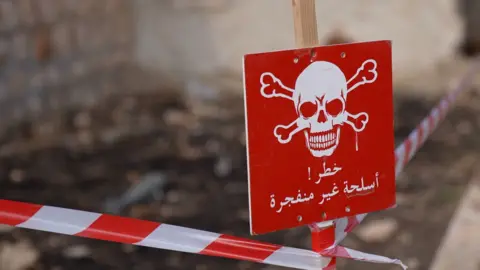
The White Helmets say they have identified and cordoned off around 117 minefields in just over a month.
They are not the only ones working to clear mines and UXOs, but it seems that there is little co-ordination between the efforts of various organisations.
There are no accurate statistics for the areas contaminated with UXOs or landmines. But international organisations, such as the Halo Trust, have drawn up approximate maps.
Halo Syria programme manager Damian O’Brien says that a comprehensive survey needs to be done for the country to understand the scale of contamination. He estimates that around a million devices would need to be destroyed to protect civilian lives in Syria.
“Any Syrian army position is quite likely to have some landmines laid around it as a defensive technique,” Mr O’Brien says.
“In places like Homs and Hama, there are entire neighbourhoods which have been almost completely destroyed. Anybody going into those structures to assess them, for either demolition or to rebuild them, needs to be aware that there may well be unexploded items in there, whether it’s bullets, cluster munitions, grenades, shells.”
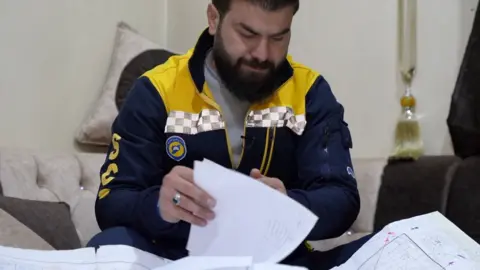 BBC News
BBC NewsThe White Helmets came across a treasure trove that could aid efforts in clearing mines. In their office in the city of Idlib, Mr Talfah shows us a stack of maps and documents, left behind by government forces.
They show locations, numbers and types of mines planted in different fields across northwestern Syria.
“We will hand over these documents to the bodies that will deal with landmines directly,” Mr Talfah says.
But the local expertise currently available in Syria does not seem to be enough to combat the serious dangers that unexploded munitions pose to civilian life.
Mr O’Brien stresses that the international community needs to work alongside the new government in Syria to improve expertise in the country.
“What we need from donors is the funding, to be able to expand our capacity, which means employing more people, buying more machines and operating over a wider area,” he says.
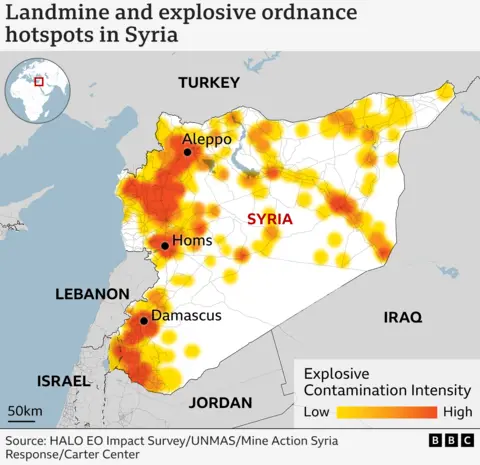
As for Mr Talfah, clearing UXOs and raising awareness about their dangers has become a personal mission. Ten years ago, he lost his own leg while clearing a cluster bomb.
He says that his injury, and all the heart-breaking incidents he’s witnessed of children and civilians impacted by UXOs, have only fuelled his persistence to keep working.
“I never want any civilian or team member to go through what I have,” he says.
“I cannot describe the feeling I get when I clear a danger threatening the life of civilians.”
But until international and local efforts are coordinated to neutralise the danger of landmines, the lives of many civilians, especially children, remain at risk.
NewsBeat
Amanda Knox fails to overturn slander conviction in Italy | World News

Italy’s highest court has decided to uphold the conviction of Amanda Knox for slander related to the 2007 murder of her British flatmate, Meredith Kercher.
The ruling is the latest part of a 17-year legal saga which ultimately exonerated her for the 2007 fatal stabbing in the Italian university town of Perugia, north of Rome.
British student Meredith Kercher, 21, was brutally murdered in the apartment she shared with Amanda Knox, the American who was initially found guilty of the killing along with her former Italian boyfriend Raffaele Sollecito.
Ms Knox served four years in prison before being acquitted in 2011, along with Mr Sollecito. They were fully exonerated by Italy’s highest court in 2015.
But among a complex series of legal twists and turns, in June 2024, an appeals court in Florence handed Ms Knox, 37, a
three-year sentence for wrongly accusing a Congolese man of the murder.
Patrick Lumumba was the owner of a bar where Ms Knox, then a 20-year-old university student, had worked part-time.
She avoided jail as the sentence counted as time already served in prison.
Last June, she lost her bid to overturn that conviction and later told Sky TG24, Sky News’ sister channel in Italy, that she was a “victim” and did not slander anyone.
“I didn’t slander Patrick; I didn’t kill my friend [Meredith]. I have been unjustly accused for 17 years. I spent four years in prison as an innocent,” she said.
She claimed that during her initial police questioning, she was “psychologically tortured, abused and mistreated” by officers.
Ms Knox was not at the hearing at Italy’s top court on Thursday, instead following it from the US. Earlier this week she wrote on X that “waiting is the hardest part”.
But her lawyer, Luca Luparia Donati, told Sky News they were “incredulous” at the decision and would consider “supranational initiatives to rectify what we believe to be a judicial error”.
Patrick Lumumba, who was in the court, said: “I am very satisfied because Amanda made a mistake and this sentence must accompany her for her entire life.”
Ms Knox was ordered to pay the trial’s legal costs, as well as those of Mr Lumumba’s lawyer.
Read more:
Knox: Why was she back in court?
Knox Film: Trial Was ‘Soap Opera’
Amanda Knox is now a mother of two small children who advocates for criminal justice reform and campaigns against wrongful convictions.
Another man, Rudy Guede, from the Ivory Coast, was convicted of sexual assault and murder after his DNA was found at the crime scene.
He was freed in 2021, after serving 13 years of a 16-year term.
Former Perugia public prosecutor Giuliano Mignini, who led the investigation into Ms Kercher’s murder, told Sky News last year that “there may still be a culprit who took part in the murder and who has not been discovered yet”.
NewsBeat
Mobile network Three ‘really sorry’ after thousands say voice calls are down | UK News


Mobile network Three has apologised after customers across the country reported problems making and receiving voice calls.
More than 10,000 people have logged problems on outage site Downdetector, with the first issues reported around 1pm.
The network said a “small percentage” of customers were affected and that it was working hard to fix it.
People on X reported problems in places such as Yorkshire, Derbyshire, North Lanarkshire and London.
“Six hours in and I still can’t make or receive a call!” said user @nameisrichard.
“I’m trying to organise my mother’s funeral and I can’t make, or receive, a single call. It’s appalling,” said @flynn1965.
@bertis100 posted: “We have no coverage since 1pm in Motherwell Scotland.”
The network first apologised this afternoon but said data and 999 calls were working as normal.
Three repeated the message at 7.30pm and said it was “really sorry” for the inconvenience.
However, its latest message only mentioned data services were unaffected, suggesting emergency calls might be impacted after all.
The firm’s coverage checker is currently unavailable on its website.
Read more from Sky News:
Meta denies ‘forcing’ people to follow Trump
Digital driving licences to be introduced this year
More than 5,000 people were still self-reporting problems on the Downdetector site just before 8pm.
It was announced last month that Three’s merger with Vodafone had been approved, with the companies promising an improved service and an £11bn investment programme.
The merger is expected to formally complete during the first half of 2025.
NewsBeat
Watch live: Sentencing of Southport killer Axel Rudakubana for murdering three girls at Taylor Swift dance class

Warning: This livestream may contain distressing content.
Watch live as Southport killer Axel Rudakubana is sentenced today (23 January) for murdering three young girls in a frenzied knife attack last year.
Rudakubana, 18, stabbed and killed the girls, aged between six and nine, with a 20cm-long kitchen knife as he ambushed a Taylor Swift-themed dance class in Southport, Merseyside.
Wearing a surgical face mask while armed with the blade, the then 17-year-old travelled five miles from his family home to the studio where he killed Alice da Silva Aguiar, Bebe King and Elsie Dot Stancombe.
As a trial was set to begin at Liverpool Crown Court on Monday, the teenager pleaded guilty to the murder of the three children as well as the attempted murders of eight others.
He also admitted production of a biological toxin and possession of information likely to be useful to a person committing or preparing to commit an act of terrorism. He also pleaded guilty to possession of a knife.
Back at Liverpool Crown Court on Thursday, he will be sentenced for a total of 16 charges.
NewsBeat
Three mobile customers tell BBC outage preventing 999 calls

Customers of the mobile network, Three, have told the BBC they cannot make 999 calls, as the network faces a significant outage.
The firm has apologised after more than ten thousand people told outage tracker Downdetector they were unable to make or receive phone calls on Thursday.
The BBC has been told by members of the public that 999 calls will not connect from their devices using the Three network. The BBC has not been able to independently verify their claims.
Three told the BBC it was “investigating this urgently”, adding that data from emergency services showed the “majority” of 999 calls were being “connected via other networks”.
There have also been several thousand reports from users of Smarty and ID Mobile – smaller mobile companies which use Three’s network.
Three’s support team has been telling customers that it does not “have a timeframe” for a fix, but that the firm is “working hard to resolve this as soon as possible”.
In a statement to the BBC, a Three spokesperson said the company is “aware of a number of reports that customers have not been able to connect to 999 calls”.
“We are taking this very seriously and are investigating this urgently and we apologise if anyone has been unable to successfully contact emergency services.
“Call data from the emergency services shows that the majority of 999 calls being placed via our network are being connected via other networks,” the spokesperson added.
In an earlier statement, Three had said that people were still able to use mobile data services and make 999 calls during the outage, though multiple people had told the BBC that was not the case for them.
Three has around 10.5m customers across the UK, according to its website, but it is unclear how many of them are affected by the outages.
Many people on social media have shared their frustration at the outage and described the disruption they said it had caused them.
One person claimed they had “missed a medical appointment” as a result of being unable to receive calls, while another said the issues had left their daughter “stranded”.
And several people have claimed they would be leaving the network altogether.
In a statement the regulator Ofcom said: “We are aware that Three is experiencing problems with its network. We are in contact with Three to establish the scale and cause of the problem as soon as possible.”
It is not known whether customers will be able to claim compensation for the outage, although according to the Ofcom website it “may be appropriate” for providers to offer refunds “while repairs are being made”.
It comes a month after the UK regulator gave the go-ahead for Three to merge with former rival Vodafone in a £16.5bn deal.
It comes the same day a major outage affected artificial intelligence tool ChatGPT.
Politics
Axel Rudakubana: Labour blasted for ‘double standards’ over failings
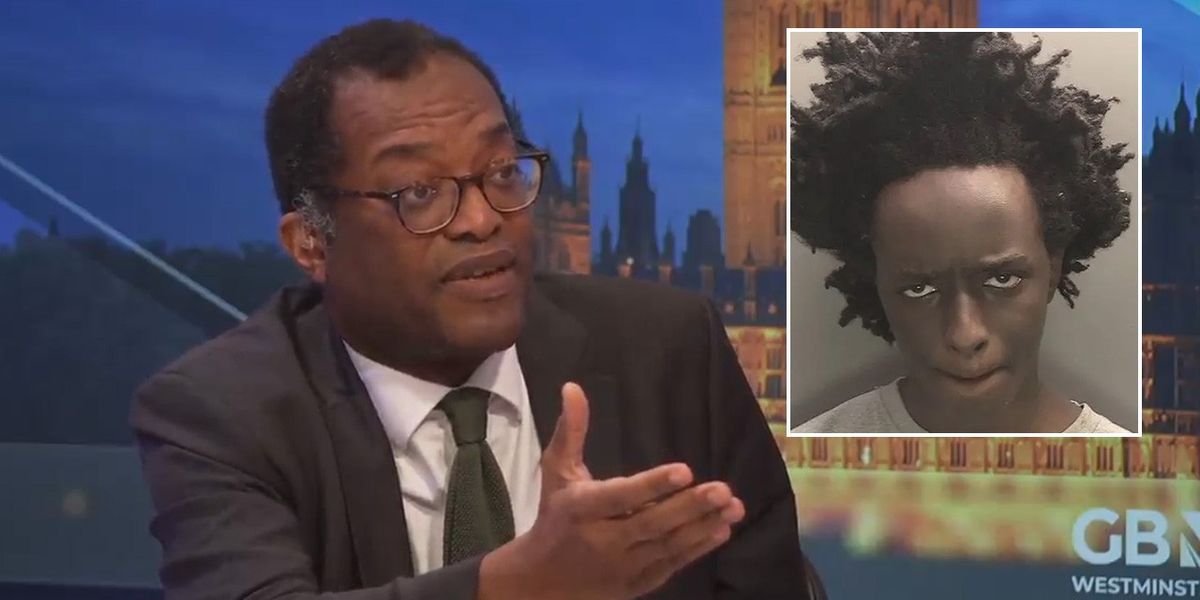
Former chancellor Kwasi Kwarteng has accused authorities of suppressing crucial information about the Southport dance class killer, claiming they presented him as “a Welsh choir boy” to the public.
Speaking on GB News, Kwarteng said officials “clearly knew things about the killer which they suppressed” in the aftermath of the attacks.
“At the time of the murder, they essentially were presenting the killer as a Welsh choir boy,” he said.
The former chancellor suggested there was a deliberate withholding of information about Axel Rudakubana’s background and potential motivations.

GB News / CPS
“Either they suppressed it for whatever reason, and we need to get to the bottom of it, or it was a cover up because they felt that in that very patronising way, they felt that people couldn’t handle that information,” Kwarteng said.
Rudakubana, 18, pleaded guilty earlier this week to murdering three young girls at a Taylor Swift-themed dance class in Southport last July.
He is due to be sentenced today at Liverpool Crown Court – while his crimes could warrant a whole life order, this cannot be applied as he was 17 at the time of the offences.
Kwarteng claimed Merseyside Police were instructed by “people on high” not to release information they had about the case.
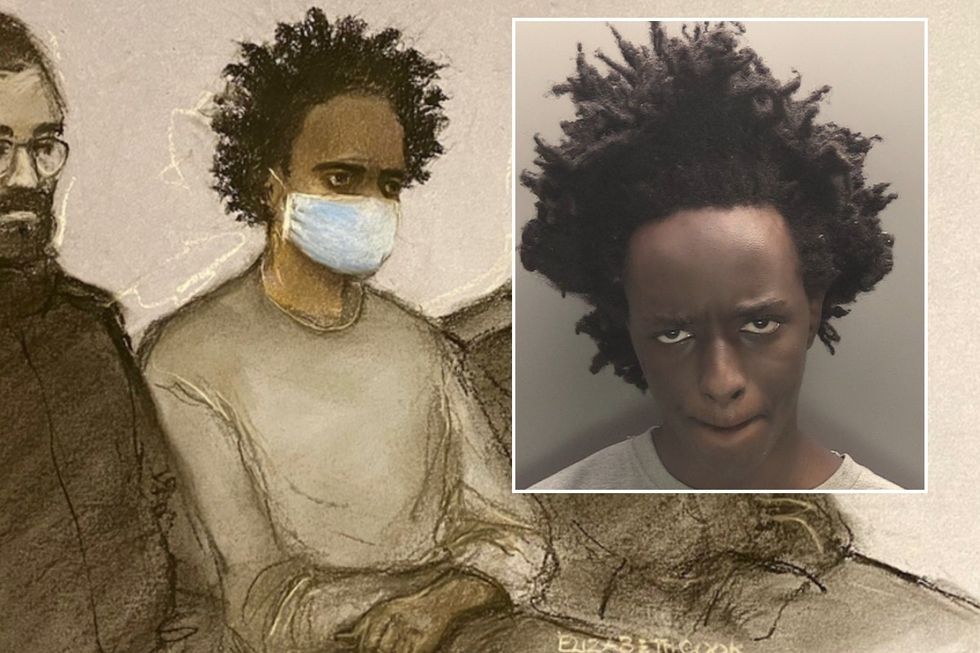
Axel Rudakubana will be sentenced in court today for the Southport attack
CPS/PA
“What was so crazy about that was that it actually stoked the very thing that they wanted to avoid because people were kept in the dark,” he said.
LATEST DEVELOPMENTS:
The former chancellor pointed to what he called an “obvious double standard” in how the case was handled.
“Picture a situation where the terrorist, the killer, had been a white teenager who had been found with white supremacist literature, who then went out and killed three girls of ethnic origin,” he said.
“There wouldn’t be this debate. They would have denounced it,” Kwarteng added. He also criticised how Rudakubana had “slipped through the net” despite being repeatedly referred to Prevent.
Starmer has defended his position on withholding information about the Southport killer. The Prime Minister insisted he was following “the law of the land” to prevent the case against Rudakubana from collapsing.

Kwarteng questioned how the 18-year-old ‘slipped through the net’ after being referred to Prevent three times
GB News
“You know and I know that it would not have been right to disclose those details,” Starmer told reporters. “The only losers if the details had been disclosed would be the victims and the families because it ran the risk the trial would collapse.”
Rudakubana faces a life sentence, with a minimum term to be set by the judge before he can be considered for release. Chief Constable Serena Kennedy said investigations revealed “a man with a unhealthy obsession with extreme violence” but noted that “no one ideology was uncovered.”
Deputy Chief Crown Prosecutor Ursula Doyle described it as “an unspeakable attack” that turned what should have been a day of “carefree innocence” into “a scene of the darkest horror.”
“It is clear that this was a young man with a sickening and sustained interest in death and violence,” she added.
NewsBeat
Eurovision: Hamas 7 October attack survivor to represent Israel | Ents & Arts News

A survivor of the 7 October Hamas attack has been chosen to represent Israel at Eurovision.
Yuval Raphael was at the Nova music festival when Hamas led a cross-border attack from Gaza into southern Israel.
Hundreds were killed and many were taken hostage at the event.
The amateur singer was there with friends and later told Israel’s parliament she hid under dead bodies for eight hours.
She added: “I’m going to deal with this thing for the rest of my life.”
The 24-year-old earned her place at Eurovision, taking place in Switzerland in May, after coming first in the Rising Star singing contest on Israeli TV.
She won with a performance of ABBA’s Dancing Queen which she dedicated to victims of the attack which kick-started the war between Israel and Hamas.
After winning, she said: “I can’t explain how excited and ready I am.
“Thank you for giving me this huge honour and trusting me to represent my country on the grand Eurovision stage in Switzerland.”
In the months since the 2023 attack, which killed over 1,200 people, Israel has killed over 45,000 people in Gaza, according to the health ministry which doesn’t distinguish between fighters and civilians.
Around 90% of the enclave’s population of 2.3 million people are said to have been displaced.
A ceasefire was recently agreed for the conflict in Gaza, and will see the return of hostages and prisoners.
Read more from Sky News:
Woman jailed for causing baby’s death
Sainsbury’s to cut over 3,000 jobs
Record-breaking Oscar nominations revealed
Last year’s Eurovision was overshadowed by the war in Gaza, with large demonstrations protesting against Israel’s participation, and the country’s representative was kept under tight security throughout.
NewsBeat
Why wasn’t Southport killer Axel Rudakubana given a whole-life order?

Southport killer Axel Rudakubana been jailed for a minimum of 52 years after pleading guilty to murdering three young girls in a frenzied knife attack last year.
Rudakubana, 18, stabbed and killed the girls aged between six and nine with a 20cm-long kitchen knife as he ambushed a Taylor Swift-themed dance class in Southport, Merseyside.
Wearing a green hoodie, a surgical face mask and armed with the blade, the then 17-year-old travelled five miles from his family home to the studio where he unleashed his murderous rampage.
Sir Keir Starmer vowed the attack would be a “line in the sand” for Britain while announcing a public inquiry into the atrocity after the killer admitted to 16 offences.
However, despite the lengthy sentence Rudakubana was not given a whole life order. The Independent takes a look at what one is below, and why the killer has avoided one.

What is a whole life order?
An offender can be sentenced to a whole life order – or “whole life tariff” – for the most serious cases of murder, meaning their crime was so serious they will never be released from prison.
There were 65 prisoners serving whole life orders in the UK as of 30 June 2023, according to the Ministry of Justice.
Killers Rosemary West, Levi Bellfield, Michael Adebolajo, Wayne Couzens and Lucy Letby were among those serving this type of sentence.

How is it different to a life sentence?
Any offender found guilty of murder must be given a life sentence. However, a judge must decide whether to set a minimum term which must be served in full before release on licence, or impose a whole life order.
A murderer will serve a life sentence with a minimum term for the rest of their life, but does not necessarily spend this entire time in prison.
They would usually serve a term in prison, and then be released on licence subject to certain conditions. For example, the minimum term for murder with a knife is 25 years, then the offender would be released on licence. If they broke the conditions of this licence at any point, they could be sent back to prison.

Why has Rudakubana avoided a whole life order?
A judge cannot impose a whole life order on anyone who was under the age of 18 at the time of the offence, irrespective of the seriousness of that offence.
Despite being aged 18 at the time of his conviction, Rudakubana was 17 when he murdered Bebe King, six, Elsie Dot Stancombe, seven, and Alice da Silva Aguiar, nine.
NewsBeat
Email demands US government workers report DEI programmes

The Trump administration emailed thousands of federal employees on Wednesday, ordering them to report any efforts to “disguise” diversity initiatives in their agencies or face “adverse consequences”.
The request came after President Donald Trump banned diversity, equity and inclusion (DEI) offices and programmes throughout the government.
Emails seen by the BBC directed workers to “report all facts and circumstances” to a new government email address within 10 days.
Some employees interpreted it as a demand to sell out their colleagues to the White House.
“We’re really freaked out and overwhelmed,” said one employee at the Department Health and Human Services (HHS).
The Office of Personnel Management, which manages the federal workforce, issued guidance requiring agency heads to send a notice to their staff by 17:00 eastern time on Wednesday. It included an email template that many federal staffers ultimately received that night.
Some employees, like those at the Treasury Department, got slightly different versions of the email.
The Treasury Department email excluded the warning about “adverse consequences” for not reporting DEI initiatives, according to a copy shared with the BBC.
In one of his first actions as president, Trump signed two executive orders ending “diversity, equity, and inclusion” or “DEI” programmes within the federal government and announced any employees working in those roles would immediately be placed on paid administrative leave.
Such programmes are designed to increase minority participation in the workforce and educate employees about discrimination.
But critics of DEI, like Trump, argue that the practice itself is discriminatory because it takes race, gender, sexual identity or other characteristics into consideration.
Trump and his allies attacked the practice frequently during the campaign.
In a speech Thursday at the World Economic Conference in Davos, Switzerland, Trump declared he was making America a “merit-based country”.
Critics of DEI have praised Trump’s decision.
“President Trump’s executive orders rescinding affirmative action and banning DEI programs are a major milestone in American civil rights progress and a critical step towards building a colour-blind society,” Yukong Mike Zhao, president of the Asian American Coalition for Education, said in a statement.
The group had supported a successful effort at the US Supreme Court to overturn affirmative action programmes at US universities.
But current federal employees, who spoke to the BBC on condition of anonymity because they feared retaliation, said that the email they received felt more like an attempt to intimidate staff than to make the government more fair.
The White House did not immediately respond to a request for comment.
President Trump has signed a torrent of executive orders since he took office, including a hiring freeze in the federal government, an order for workers to return to the office and an attempt to reclassify thousands of government employees in order to make them easier to fire.
The HHS employee who spoke to the BBC criticised the government’s DEI practices, believing that while it was important to build a diverse staff and create opportunities in health and medical fields, “identity politics have played into how we function normally and that’s not beneficial to the workforce”.
“But that doesn’t mean I want my colleagues to get fired,” the employee added.
He described the the impact the email and the DEI orders had on his agency as “very calculated chaos”.
The employee’s division had been thrown into confusion, he said, with questions about hiring practices going forward, as well as what programmes and directives were allowed to continue, given Trump’s broad definition of DEI.
A second HHS employee said that hiring and research grants had been frozen and the entire department staff was waiting to see what they could do next.
The HHS, and one of its subsidiary agencies, the National Institutes of Health (NIH), issue millions of dollars in federal grants to universities and researchers across the globe to advance scientific research.
Agency employees feared that the DEI order could have an impact outside the government as well. One questioned if grants that allowed laboratories to create more opportunities for hiring minority scientists and medical professionals would now get the axe.
An employee who worked at the Food and Drug Administration told the BBC that she had not received the email, but all DEI-related activities had been paused.
“We have been told by seniors to keep doing our jobs,” she said. “But there is a sense of fear about how it’s going to have an impact on our work in general.”
NewsBeat
PM accused of 'pathetic bullying' by environmental campaigner after NIMBY article


Keir Starmer has been accused of “pathetic bullying” by a Norfolk environmental campaigner who was singled out and ridiculed by the prime minister in an article in the Daily Mail.
Politics
‘We have to kick start the economy!’ MP defends building plans as Labour accused of ‘ignoring will of the people’

Labour MP Matthew Pennycook has defended the Government’s new planning reforms, insisting that local communities will retain their right to object to developments.
Speaking to GB News, Pennycook emphasised that “no one is saying that the views of local communities should be ignored”.
The defence comes as part of Labour’s broader initiative to streamline planning processes for major infrastructure projects across the UK.
The Government plans to reduce the number of legal challenges allowed against major infrastructure projects from three to one for “cynical cases lodged purely to cause delay.”

Matthew Pennycook said that they are not ignoring local communities
GB News
Speaking to GB News, Pennycook said: “No one is saying that the views of local communities, local people up and down the country, should be ignored under any of the changes we’re making. People will still have a right to object to planning applications.
“They will keep the right to challenge the lawfulness of government decisions. What we’re saying today is that as part of our plan for change, we’ve got to kick start economic growth.
LATEST DEVELOPMENTS
“We’ve got to streamline the delivery of the critical national infrastructure that our country needs, whether that’s energy, transport or aviation projects.
“We already made a number of changes to national planning policy last year to aid with that objective. We’re making further changes to the planning and infrastructure bill we’re bringing forward in the coming months.
“As part of that package, what we’re saying today is that your ability to bring forward repeated judicial review permission requests shouldn’t be allowed.
“We’re going to reduce the number of those permission requests from three to two in most cases. And in cases where a judge says that this challenge has no merit whatsoever from three to one, that will get the delivery of critical national infrastructure speeded up.

Keir Starmer has vowed to defeat what he calls “blockers”
PA
“That will have a real world impact. Because, I’m sure your viewers put it to you repeatedly, it is just too difficult to get anything built in this country.”
The changes follow recommendations from Lord Banner KC’s review of legal challenges against major building projects.
Lord Banner said: “I saw broad consensus from claimants to scheme promoters that a quicker system of justice would be in their interests, provided that cases can still be tried fairly.”
Prime Minister Keir Starmer has vowed to defeat what he calls “blockers” who are preventing the UK from completing vital infrastructure projects.

The government plans to reduce the number of legal challenges allowed against major infrastructure project
GB News
“For too long, blockers have had the upper hand in legal challenges – using our court processes to frustrate growth,” Starmer said.
He added: “We’re putting an end to this challenge culture by taking on the NIMBYs and a broken system that has slowed down our progress as a nation.”
The Prime Minister described the reforms as “taking the brakes off Britain by reforming the planning system so it is pro-growth and pro-infrastructure.”
According to the government, projects that have faced significant delays include the Sizewell C nuclear plant, the A47 national highway project and new windfarms in East Anglia.
-

 Fashion8 years ago
Fashion8 years agoThese ’90s fashion trends are making a comeback in 2025
-

 Entertainment8 years ago
Entertainment8 years agoThe Season 9 ‘ Game of Thrones’ is here.
-

 Fashion8 years ago
Fashion8 years ago9 spring/summer 2025 fashion trends to know for next season
-

 Entertainment8 years ago
Entertainment8 years agoThe old and New Edition cast comes together to perform You’re Not My Kind of Girl.
-

 Sports8 years ago
Sports8 years agoEthical Hacker: “I’ll Show You Why Google Has Just Shut Down Their Quantum Chip”
-
Business8 years ago
Uber and Lyft are finally available in all of New York State
-
Entertainment8 years ago
Disney’s live-action Aladdin finally finds its stars
-
Sports8 years ago
Steph Curry finally got the contract he deserves from the Warriors
-
Entertainment8 years ago
Mod turns ‘Counter-Strike’ into a ‘Tekken’ clone with fighting chickens
-
Fashion8 years ago
Your comprehensive guide to this fall’s biggest trends












You must be logged in to post a comment Login